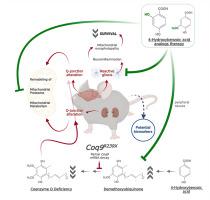Redox Biology ( IF 10.7 ) Pub Date : 2022-07-15 , DOI: 10.1016/j.redox.2022.102403 Pilar González-García 1 , María Elena Díaz-Casado 1 , Agustín Hidalgo-Gutiérrez 1 , Laura Jiménez-Sánchez 2 , Mohammed Bakkali 3 , Eliana Barriocanal-Casado 4 , Germaine Escames 1 , Riccardo Zenezini Chiozzi 5 , Franziska Völlmy 5 , Esther A Zaal 6 , Celia R Berkers 6 , Albert J R Heck 5 , Luis C López 1

|
Defects in Coenzyme Q (CoQ) metabolism have been associated with primary mitochondrial disorders, neurodegenerative diseases and metabolic conditions. The consequences of CoQ deficiency have not been fully addressed, and effective treatment remains challenging. Here, we use mice with primary CoQ deficiency (Coq9R239X), and we demonstrate that CoQ deficiency profoundly alters the Q-junction, leading to extensive changes in the mitochondrial proteome and metabolism in the kidneys and, to a lesser extent, in the brain. CoQ deficiency also induces reactive gliosis, which mediates a neuroinflammatory response, both of which lead to an encephalopathic phenotype. Importantly, treatment with either vanillic acid (VA) or β-resorcylic acid (β-RA), two analogs of the natural precursor for CoQ biosynthesis, partially restores CoQ metabolism, particularly in the kidneys, and induces profound normalization of the mitochondrial proteome and metabolism, ultimately leading to reductions in gliosis, neuroinflammation and spongiosis and, consequently, reversing the phenotype. Together, these results provide key mechanistic insights into defects in CoQ metabolism and identify potential disease biomarkers. Furthermore, our findings clearly indicate that the use of analogs of the CoQ biosynthetic precursor is a promising alternative therapy for primary CoQ deficiency and has potential for use in the treatment of more common neurodegenerative and metabolic diseases that are associated with secondary CoQ deficiency.
中文翻译:

Q-连接和炎症反应是 CoQ 缺乏症的关键病理和治疗因素
辅酶 Q (CoQ) 代谢缺陷与原发性线粒体疾病、神经退行性疾病和代谢状况有关。辅酶 Q 缺乏的后果尚未得到完全解决,有效的治疗仍然具有挑战性。在这里,我们使用原发性 CoQ 缺乏症 ( Coq9 R239X ) 的小鼠,我们证明 CoQ 缺乏深刻地改变了 Q 接头,导致肾脏中线粒体蛋白质组和代谢的广泛变化,并在较小程度上影响大脑。CoQ 缺乏还会诱发反应性神经胶质增生,从而介导神经炎症反应,这两者都会导致脑病表型。重要的是,用香草酸 (VA) 或 β-间苯二酚酸 (β-RA)(CoQ 生物合成天然前体的两种类似物)进行治疗,可以部分恢复 CoQ 代谢,特别是在肾脏中,并诱导线粒体蛋白质组和线粒体蛋白质组的深度正常化。代谢,最终导致神经胶质增生、神经炎症和海绵体变性减少,从而逆转表型。总之,这些结果为 CoQ 代谢缺陷提供了关键的机制见解,并确定了潜在的疾病生物标志物。此外,我们的研究结果清楚地表明,使用 CoQ 生物合成前体类似物是治疗原发性 CoQ 缺乏症的一种有前途的替代疗法,并且有潜力用于治疗与继发性 CoQ 缺乏症相关的更常见的神经退行性和代谢性疾病。











































 京公网安备 11010802027423号
京公网安备 11010802027423号